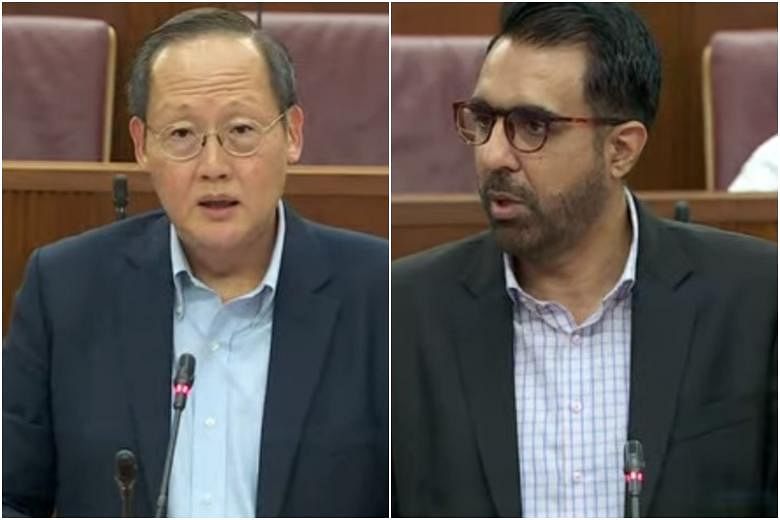SINGAPORE - An alternative tax proposal put forth by the Workers' Party will ultimately result in a system where the approach towards revenue is to just "squeeze anyone who does well", from the middle income upwards, said Manpower Minister Tan See Leng on Tuesday (March 1).
Joining the Budget debate in Parliament, Dr Tan said the Government fundamentally disagrees with the WP's proposal to further increase property tax and personal income tax, in lieu of raising the goods and services tax (GST).
"We will, as a consequence, have to increasingly shift and raise the tax burden onto the middle class," he said, noting that it is not possible to have "extremely punitive" taxes just on the top 1 per cent or 5 per cent of income earners to obtain the same amount of revenue from the GST hike.
Income taxes will also have to be raised for the upper-middle and middle income, and higher property taxes applied to a larger base of properties, he added.
"And that, I believe, is the surest way to unravel and destroy our social compact and trust in our society, and Singapore will not hold together."
In response, WP chief and Leader of the Opposition Pritam Singh said he disagreed with Dr Tan's characterisation.
"In the spirit of seeking a more equitable tax distribution amongst various segments of society, I think the WP is fully entitled to raise alternate forms of revenue, which we have," he said.
"You've cherry-picked some and criticised them. I think you're entitled to, but if you look at the proposals holistically, you would understand that the Workers' Party has put up alternatives for a rise in GST."
Mr Singh had on Monday said the WP would object to the 2022 Budget as it disagrees with the GST hike, even though it supports the direction to strengthen Singapore's social compact towards a fairer and more inclusive society.
WP MP Jamus Lim (Sengkang GRC) suggested other means of deriving revenue to make up the $3.5 billion expected from increasing the GST from 7 per cent to 9 per cent over two steps from 2023 to 2024. These include raising corporate tax and additional taxes on wealth.
On Tuesday, Dr Tan said the WP's approach was philosophically at odds with the Government's approach to have the rich carry a heavier load, by raising taxes on personal income and luxury vehicles, he said.
Although the Government's mantra is that "the well-off will pay more and receive less, and the less well-off will receive more and pay less", he said it is not possible to get the entire GST hike revenue by "loading it all on just those at the very top".
"The consequence is that… it will percolate down to our middle and upper-middle income, including those who have benefited from our education system, our years of social mobility; those who have toiled, who have worked very hard all through the years to move up from more modest circumstances," Dr Tan said.
He added that property taxes will have to be applied to more properties, and suggested that this could affect all condominiums, executive condominiums and even larger Housing Board flats, hitting residents across the country from Marine Parade to Bishan, Bukit Timah and even Sengkang and Aljunied.
The Government has said that the new tax rules for owner-occupied residential properties proposed at this year's Budget will impact only high-end properties, leaving HDB flats and at least two-thirds of private properties untouched.
Dr Tan said the WP's proposal sends the message that "look, there's someone better off who can afford to take on all of the burden, you don't have to put in your fair share". "Now that is not good nor is it sustainable for our social compact."
He added: "If we do what has been proposed and suggested, the middle-income, the upper middle-income, those who have worked hard, who have done perhaps better than their parents' expectations and aspirations - they will feel betrayed."
Rising to respond, Mr Singh (Aljunied GRC) rejected Dr Tan's description of the WP's intentions as putting a "more punitive load" on Singaporeans.
"The point of our suggestions really is a more equitable load," he said. "How do you balance things in a manner which is more equitable for society going forward, for a fairer, more sustainable, and more inclusive society?"
Associate Professor Lim also sought to clarify that only one of the WP's suggestions - on wealth tax - pertains to high-income and high-net worth individuals.
"Even within that particular scenario, we had made very modest recovery assumptions, amounting to something in the order of $1.2 billion on wealth taxes alone," he noted.
The remainder of the $3.5 billion revenue would have been met by more broad-based forms of taxation, said Prof Lim.
"It's important to clarify that we are not philosophically seeking a very narrow tax base," he added.
"We are in fact seeking alternative revenue levers that subscribe to the general principles of public finance, which are, as much as possible, to spread the revenue schemes in as broad a manner as possible - but at the same time, recognising the importance… of a certain degree of fairness and equity."
In reply, Dr Tan said the impression was that the WP had placed more emphasis on its wealth tax proposal, which he reiterated could result in a "very, very high, disproportionate burden" on a small group of Singaporeans.
"Eventually, for us to sustain it… this would end up percolating or pervading down to the upper middle-income and eventually affecting the middle income as well," he repeated. "This will eventually end up having to be more spread out in terms of having to be borne by more people."
Dr Tan then said Finance Minister Lawrence Wong would cover more aspects of taxation in his round-up speech on Wednesday.


